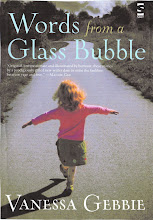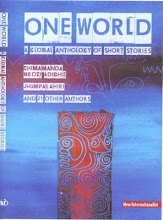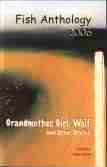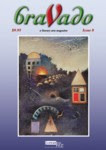Well, he is kind of my hero. He is the one who started me off on this writing journey, and to whom I will be eternally grateful.
Earlier this year, Norman Geras invited me to write on my favourite book for his illustrious series... and this was my contribution.
August 28, 2007
Writer's choice 117: Vanessa Gebbie
Vanessa Gebbie teaches creative writing and is assistant editor of Cadenza Magazine. Her debut collection of short fiction, Words from a Glass Bubble, is forthcoming early in 2008 from Salt Publishing. The opening of her novel-in-progress won the Daily Telegraph Novel Competition in May 2007. In this post Vanessa talks about W.G. Sebald's Austerlitz.
Vanessa Gebbie on Austerlitz by W.G. Sebald
Like Andrew Bolt earlier in this series, when I was invited to write on my favourite book, I started wondering what 'favourite' might mean. That wondering took all of five seconds. It's not like being asked what book you'd take to a desert island, is it? My favourite book is Austerlitz by W.G. Sebald.
I purchased this in a deeply intellectual moment, sheltering from a cloudburst in Brighton Waterstone's in early 2002, waiting for a break in the torrent so I could make a dash for my car. A deeply deeply intellectual moment... I liked the cover. (Here, one could break off and start a hare running about marketing, about airheads. About the effects of thunderstorms on the brain. But one won't. One will, however, use 'one' just twice more.) One was not a writer of fiction in 2002.
On one level, Austerlitz is 'about' a journey of painful rediscovery of identity that goes something like this: Kindertransport. Well-meaning upbringing in Wales erasing memory. The adult piecing together his own past. I was hooked. Well, give an adopted child like me (we never grow up) anything like that and they wallow... sure.
Oh, but.
Nothing in this book seemed to have grown from anything else I'd read. Where were the character descriptions - the oh-so-cleverly-placed mirrors allowing me to 'see' the furrowed or beetling brows, the tousled curls, the steady stare and other clichés? Where were the stage directions – Gerald rose from his chair, crossed to the buffet and poured a gin - or Amanda pouted, repaired her lipstick and closed her tiny shoulder bag?
They do not exist. They do not exist and yet I am 'with' the words. I 'see' just as if I was being led by the nose by a lesser author.
Where are the skeletons of structure? Where are the paragraph breaks? Indeed, where are the paragraphs? Where are the chapter headings? Indeed, where are the chapters? The things that let us break up a work into bite-sized manageable chunks. That allow us to 'read just one more bit before bed'?
They do not exist. They do not exist and yet I am not flummoxed. I do not drown in text. On the first read I did not even notice.
On the second read, I was enthralled for different reasons. Now, I felt, I was in the presence of a writer who was breaking the rules with impunity. And it was working. The book held more than one source of power for me, and that power still remains.
I remember after the first couple of reads, having one of those 'lightbulb' moments. I'd been writing as a freelance journalist for a while, hadn't thought of fiction, not seriously. Fiction was something other people wrote. Here was something telling me to write. And more importantly, telling me how, and why.
A week later, I enrolled on the certificate in Creative Writing at the local university. I wanted to do a dissertation (or whatever it was called there) on W.G. Sebald. When I said as much to the tutor, I had a two word reply: 'Who's that?' I lasted a few terms, and slid away. I'd been silly. My real tutor was in those pages.
Sebald's obituary (he died in 2001 in a traffic accident) in the Guardian says:
Sebald doubted whether those who had never experienced Theresienstadt or Auschwitz could simply describe what occurred there. That would have been presumptuous, an appropriation of others' sufferings. Like a Medusa's head, he felt that the attempts to look directly at the horror would turn a writer into stone, or sentimentality.
It was necessary, he found, to approach this subject obliquely, and to invent a new literary form, part hybrid novel, part memoir and part travelogue, often involving the experiences of one "WG Sebald", a German writer long settled in East Anglia. He was reluctant to call his books "novels", because he had little interest in the way contemporary writers seemed to find all meaning in personal relationships, and out of a comic but heartfelt disdain for the "grinding noises" which heavily plotted novels demanded. "As he rose from the table, frowning..." was precisely the type of clumsy machinery, moving a character from here to there, which Sebald mocked.
.....
Sebald, who was a devoted photographer, used images in his novels. Sometimes they were found objects, postcards, or something from an old newspaper... The photographs appear without captions and acquire meaning from the surrounding text. We read those enigmatic images through the story which Sebald provides, and then, later, come to the suspicion that they were something more (or less) than an illustration or documentation of the story. The way he handled visual images was characteristic of the way he wrote, determined not to make his point in an assertive way, but with implication and suggestion.
.....
His lectures were sardonic and challenging, and possessed the same dry wit, and feel for irony, which enlivened his conversation. He had an incomparable feel for the oddness of life in East Anglia, where he was an inveterate walker and connoisseur of the isolation of an area which has been left largely untouched. There was not even a decent autobahn in East Anglia, and that suited him fine.
One of the most important things Sebald taught me (and is still teaching) is to do with thematic content. I had always struggled with the concept of 'theme', never really understood the use of 'theme' in literary fiction other than to say that it's what 'drives' a writer to write. I could never get to grips with other writers' fascination with everyday relationships; they seemed to me to be just 'there', inescapable. Why write about them? What was new?
Sebald too couldn't see why writers seemed to find meaning solely in more or less banal relationships, and I'm guessing that's why I just couldn't see any thematic originality/strength in what many other writers were presenting me with. And why I love the surreal, the irreal. And Sebald.
Would it be totally off-beam to suggest that Austerlitz is the novel I would recommend to illustrate depth of theme as opposed to varying degrees of weightlessness? I'd recommend it to anyone who wants to see how a good piece of fiction 'works' thematically - the engine bares itself if you look hard enough.
And I'd also recommend it to anyone who wants to read a thematically coherent novel. How many novels have we all read that indulge in trips down side alleys, just because they can? And in the end, whereas those trips might entertain, they break the 'song'.
What 'song'?
Let's take it as read that this thing called 'theme' is the motivating force behind the work, the reason for it being in existence at all – the thing that the writer cared enough about to spend not only researching and writing time on but also emotional energy in crafting something to communicate that to his reader. It drives the work. It is what makes the work resonate, not just entertain. It's what makes it sing.
What makes something resonate? I guess if we are going back to 'resonance' as 'vibration' rather then something felt emotionally, it makes me think of the 'singing' of a wineglass, as a finger wetted with wine or spittle runs round and round the rim until the glass sings. A fine note rises into the air from no throat. It hangs there, a little bit of magic... Until the finger slips.
Literary themes have always fascinated me. Troubled me. I had the same sense that a child gets when it overhears adults talking and the language goes over its head. A sense that this was not the whole picture. Now, having met Sebald's Austerlitz, I might understand a little more of the strength of themes in work that has real depth as opposed to 'fine', 'OK' and 'competent' literary fiction that restricts itself to an 'exploration of relationships' as an end in itself.
Of course there have to be characters. And of course those characters will interact, and the causes and effects of that interaction will produce tensions and events that drive the work forward. They will entertain. May even provoke a frisson of recognition, empathy, disgust, whatever, in the reader.
But... I don't think that is enough. That is the small beer. So we are human... and? Since when was that original? Unless the interactions, causes and effects lead to the communication of something that forces the reader to reappraise his view of the world in a wider sense, they have been to a certain extent 'without meaning'. And that's what I didn't understand. I didn't understand how one made the jump from the creation of causes and effects that said relatively banal things, thematically, to the bigger guns.
What about the writer as a recorder of the issues of the era? What about the writer as social historian? What about the writer holding up a mirror to a generation? Isn't that something to reach for? And since when have 'I'm in a tired marriage', 'Oops, I'm going to die', or 'I'm lonely' been issues that define an era?
What about the writer as someone who illustrates flaws that run under the skin of generations, one after another, each generation refusing to learn from the mistakes of the last? What about the writer as exposer of political hypocrisy? The list is endless, and is beginning to sound to me like a 'reason' for writing. Austerlitz, in exploring one man's journey, gradually uncovers the journey of a nation and, by extension, exposes the flaws in all our histories.
The singing glass analogy above is about coherence. About not taking your finger off the rim of that glass while it's singing. About surrounding the reader with images, rivers and streams, roads and paths - use whatever analogy you want - but they must all be going the same way. Otherwise the music breaks.
You can't let the reader off the hook. You have to make the reader immerse themselves in the work, and surround them with the singing of the theme, like that wineglass, but you must NOT take your finger off the glass. You must not let the music stop. There has to be coherence.
That is entirely different from the idea of pacing and weighting the drip feed of emotion to 'hook' the reader, which seems a manipulative tool, and not a lot to do with theme.
Sebald shows me theme coherence par excellence.
If the whole book is to do with the painful uncovering of hidden memories, for a single individual and by extension, a nation, each section of careful, painstaking detail serves to illustrate that in some way. Whether it is a study of moths at night in North Wales, nurseries hidden behind false walls, shadow images thrown by sunlight, radio announcers' disembodied voices, in-depth studies of architectural history; then the plethora of detail for the sake of detail, in old libraries, catalogues of things, lives, incidents; the building of edifices over memories, so that we have to pull down those edifices to get at the memories - the whole is a kaleidoscope in which all the pieces tumble and fall to form a whole.
I could also comment on the structure echoing the content. About the gradual and painful journey both literal and metaphoric, echoed in the seemingly 'rambling' prose. But isn't that how memories surface? Piecemeal? The patterns only appearing some way down the continuum?
Some readers might criticize the coincidental meetings between narrator and Austerlitz on which the structure hangs. But again, to me these are entirely organic. Why question them? If you let go and read, the book works its magic. If you seek to judge it according to the 'rules' (whatever they be) it is the rules themselves that are found wanting. Because it works!
So yes. This is my 'favourite' book. I treasure it because it opened my eyes to me, the writer-in-waiting. The rule breaker. The maverick. And it is probably, too, the book I would take to my desert island. Why only probably? Because it's a scary question. It's not so much selecting what to take, but actively turning your back on all the others that's hard. Isn't it?




.JPG)






















